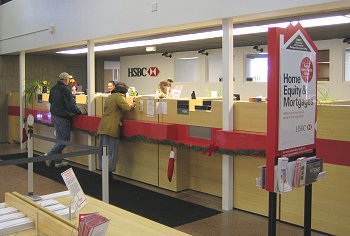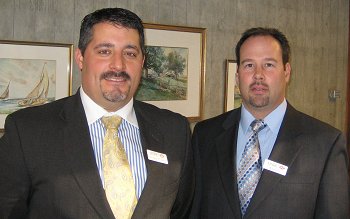- By Dan Veaner
- Business Profiles
 Print
Print  Some large corporations descend into communities to draw out as much income as possible. Others invest in the community, helping it to grow in positive ways and becoming part of the community itself. That is what Vice President & Business Specialist Ronald Poole says HSBC does in a quiet and effective way. "We strive to not only be a strong, profitable enterprise, but also to be socially responsible," he says. "One of the ways that we are very proud of that is with our green initiatives."
Some large corporations descend into communities to draw out as much income as possible. Others invest in the community, helping it to grow in positive ways and becoming part of the community itself. That is what Vice President & Business Specialist Ronald Poole says HSBC does in a quiet and effective way. "We strive to not only be a strong, profitable enterprise, but also to be socially responsible," he says. "One of the ways that we are very proud of that is with our green initiatives."This philosophy funnels down from a world-wide corporate policy to the individual employees in each of the company's 10,000 branch offices in 83 countries. And those employees then influence the people they come into contact with. "It's changed the way that I do things in terms of light bulbs, paperless accounts, reusable bags when I shop, trying to walk," Poole says. "So HSBC has profoundly affected my personal life, and we all take that same view. I'm proud to work for HSBC."
This philosophy permeates the bank's corporate culture, and local branches are a part of that. World-wide the corporation maintains a carbon-neutral status, building new energy efficient buildings where they can, and making older buildings like the downtown Ithaca branch as green as possible. "We have a pilot bank that we built in Greece, NY that is 100% self-sufficient," says the Tioga Street branch's Vice President & Branch Manager Christopher Brown. "This place is amazing. LED lighting, geothermal heating, there are no wires going to this building, solar sensitive lighting, green housekeeping products."
In his own branch he says that recycling and reuse is very important to the point where slogans like 'Think before you print' prevail, and recycling bins are used in every office, and green cleaning products are used. Offices have bins for plastics, paper, and confidential paper that is then shredded before being recycled. "Even though the building has some problems, we can still do so much within the building," Poole says. "Which we do, to stay as green as possible."
And when customers point out a wasteful energy practice, Brown listens. "I got letters in the mail about halogen lighting that we were leaving on," Brown says. "So we turned them off. We do whatever we can do."

From April through June the bank ran a world-wide green campaign to try to get customers to sign on for paperless banking. "We're not offering free checks any more for a reason," Brown says. "We're trying to get away from checks. When you think about the amount of waste that's generated just from paper alone, and all the trees that have to come down... we're going to make you pay for the checks, because that's not the bank's philosophy."
During this campaign the bank passed out green savings calculators that showed how companies could save $40,000 per year by turning off 500 computers at night and only running them for 9 hours per day. That same company could save $445,500 by turning off 500 copiers at night. But it also showed how individuals can save -- $80 per years when you turn your computer off at night, $5 per ream of printer paper if you print on both sides, $15 per year per T8 fluorescent light bulb that replaces a conventional one, and $891 by only running copiers for nine hours a day. The campaign urged walking whenever possible to reduce your car's carbon emissions, recycling, using reusable grocery bags, and investing in green companies.
Brown says that the bank likes to fund local projects, especially when there is a green angle to it. "Locally we try to get involved in pretty much everything," he says. "If somebody comes in here because they want dollars to buy the sculpture in the Commons, it's a lot harder for me to get those dollars than when the Earth Day people come. We gave them $5,000 to run Earth Day at the Farmer's Market. That's easy to do."
Some of the other organizations the bank has helped fund have been the nearly $2,000 to the Fingerlakes Land Trust, little league, Toys For Tots, Share The Warmth and many others. The bank will be helping pay for a program in the Ithaca schools to make fruits and vegetables available for students in their classrooms during the day. They also fund local labs.
"We do a lot with C-tech (Cornell Center for Technology)," Brown says. "We're financial people, so we do what we can do as a service whether it involves start-up money, lending, cash management, checking accounts, savings accounts, things of that nature. When we work with C-tech we sponsor their forum. They bring venture capitalists there to look at the new technologies. New technology usually equates to green initiatives, so that's something we're involved in."

Chris Brown (left) and Ron Poole
Poole says that getting involved in the local community is virtually part of bank officers' job description, and that part of the corporate culture is to boost local volunteerism. Brown says that many Ithaca employees do that, but it may not be visible to the public. "A lot of our employees don't tout their volunteerism," he says. "It's something they've always done. It's personal to them. We try to pull it out of them, but they don't want any credit for it."
The bank's Web site lays out the corporate policy on corporate responsibility, which includes lending and investing responsibly, sharing responsibility for the environment, reflecting diversity, involving employees in their communities, and investing in education. The bank buys 'green electricity' in the U.S., Britain, Brazil, and Australia, and offsets its own carbon emissions.
The corporation maintains $50 million in eco-partnerships with organizations like Earth Watch and the World Wildlife Fund. "Something we're very proud of is being the EPA Power Partner of the Year for two straight years," Poole says. "We were voted the Sustainable Bank of the Year by the Financial Times in 2006. In 2005 we became the first carbon neutral bank in the world."
And on a local level Brown says that companies in Tompkins County that institute green policies can take their social activism to another level by supporting other businesses with like philosophies. "I tell them that if you truly believe in this you need to do business with a company that's doing the same thing," he says. "We do run risk by doing that, because we alienate some people."
The bank puts its money where its mouth is with its own investments and investment opportunities it offers its customers. "We're one of the financial institutions that does very well with socially responsible investing," Brown notes. "We have resources available so your investment funds can go into socially and environmentally responsible funds. That's where out corporate dollars go, too. We capture our gains for the year and that's where we go to invest them to grow our business. Not that no other company in the world does it -- we just do it the best."
"And the most!" Poole ads.
----
v3i48



